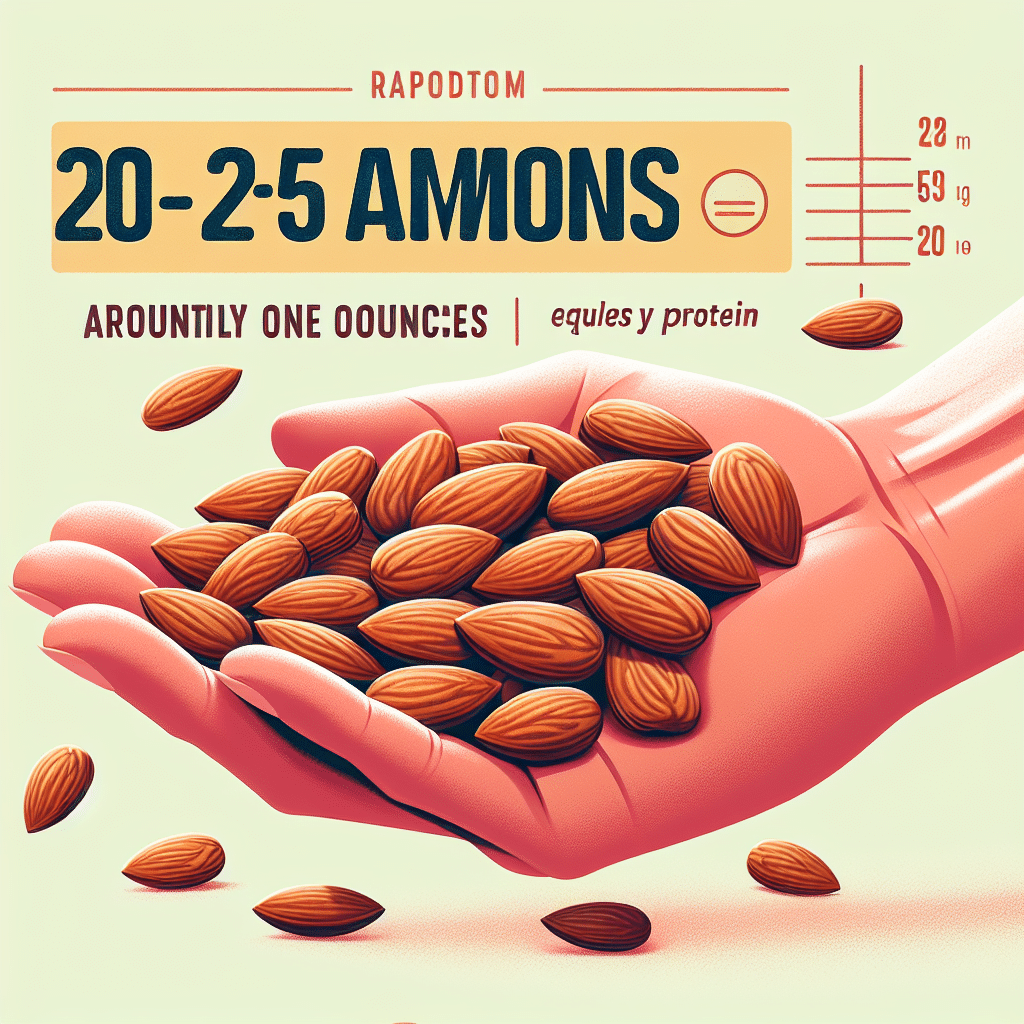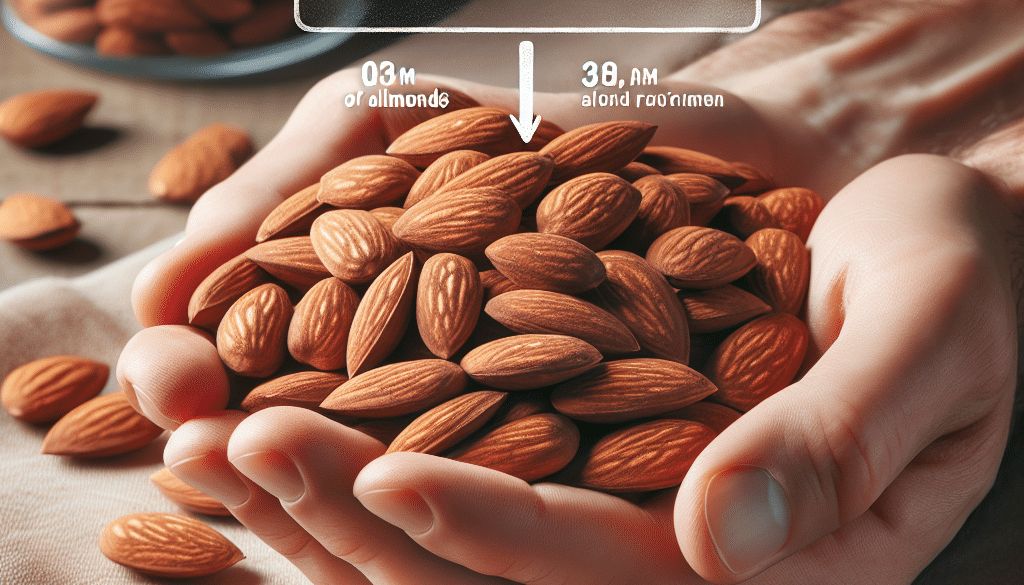How Many Almonds Should You Eat For Protein?
-
Table of Contents
- Almonds for Protein Intake: How Much is Enough?
- Understanding Protein Requirements
- The Nutritional Profile of Almonds
- How Many Almonds for Adequate Protein?
- Benefits of Almonds in a Protein-Rich Diet
- Case Studies and Research
- Almonds vs. Other Protein Sources
- How to Incorporate Almonds into Your Diet
- Conclusion: Balancing Almonds for Protein and Overall Nutrition
- Discover ETprotein’s High-Quality Protein Products
Almonds for Protein Intake: How Much is Enough?

Almonds are a powerhouse of nutrients, offering a blend of healthy fats, fiber, vitamins, and, importantly, protein. They are a popular snack among health-conscious individuals and those looking to increase their protein intake through plant-based sources. But how many almonds should you eat to meet your protein needs? This article delves into the nutritional profile of almonds, the recommended protein intake, and how almonds can fit into your diet for optimal health benefits.
Understanding Protein Requirements
Protein is a crucial macronutrient necessary for building and repairing tissues, making enzymes and hormones, and supporting immune function. The Recommended Dietary Allowance (RDA) for protein is 0.8 grams per kilogram of body weight for the average adult. However, this amount can vary based on factors such as age, sex, physical activity level, and overall health.
The Nutritional Profile of Almonds
Almonds are not only delicious but also nutritionally dense. A one-ounce serving (about 23 almonds) provides approximately 6 grams of protein. In addition to protein, almonds are rich in vitamin E, magnesium, and heart-healthy monounsaturated fats. They also contain antioxidants, which can help protect against oxidative stress.
How Many Almonds for Adequate Protein?
To determine how many almonds you should consume for protein, consider your individual protein needs and the role of almonds in your overall diet. For example, if you’re aiming for a protein intake of 50 grams per day, almonds alone won’t be enough. You’ll need to incorporate other protein sources to meet your goal.
- For a light snack: A handful of almonds (about 23 nuts) provides 6 grams of protein.
- As part of a meal: Adding 1/4 cup of almonds (about 20 grams of protein) to salads or yogurt can boost your protein intake significantly.
- For athletes or those with higher protein needs: Consider larger servings or pairing almonds with other protein-rich foods.
Benefits of Almonds in a Protein-Rich Diet
Almonds offer more than just protein. Their nutrient profile supports various health benefits:
- Weight management: The fiber and protein in almonds can help you feel full, potentially reducing overall calorie intake.
- Heart health: Almonds can help lower LDL cholesterol levels and reduce the risk of heart disease.
- Blood sugar control: The low glycemic index of almonds makes them suitable for people with diabetes.
Case Studies and Research
Several studies have highlighted the role of almonds in a healthy diet. For instance, a study published in the Journal of Nutrition found that consuming almonds can reduce hunger and improve dietary vitamin E and monounsaturated fat intake without increasing body weight.
Another study in the European Journal of Clinical Nutrition showed that participants who ate almonds as a mid-morning snack reported increased feelings of fullness, which may help control appetite and prevent overeating.
Almonds vs. Other Protein Sources
While almonds are a good source of plant-based protein, they should be part of a diverse diet that includes various protein sources. Other nuts, legumes, whole grains, and seeds also contribute to protein intake. For those who consume animal products, lean meats, dairy, and eggs are excellent protein sources.
How to Incorporate Almonds into Your Diet
There are many creative ways to include almonds in your diet:
- Add sliced almonds to oatmeal or cereal.
- Use almond butter as a spread on toast or in smoothies.
- Include whole or chopped almonds in salads or as a topping for cooked dishes.
- Snack on roasted almonds between meals.
Conclusion: Balancing Almonds for Protein and Overall Nutrition
In conclusion, almonds can contribute significantly to your daily protein intake, but they should be consumed as part of a balanced diet. The number of almonds you should eat for protein depends on your individual needs and dietary preferences. Remember to consider the full nutritional profile of almonds and the variety of other protein sources available to maintain a well-rounded and healthy diet.
Discover ETprotein’s High-Quality Protein Products
If you’re looking to supplement your protein intake beyond what almonds and other whole foods can provide, consider exploring ETprotein’s range of organic bulk vegan proteins. Their products, including rice protein, pea protein, and various seed proteins, offer high-quality, non-GMO, allergen-free options to enhance your nutrition regimen.
ETprotein’s offerings are ideal for those seeking additional protein sources to support their dietary goals, whether for sports nutrition, weight management, or general health and wellness. With a commitment to purity and quality, ETprotein stands as a trusted supplier for consumers and manufacturers alike.
About ETprotein:
ETprotein, a reputable protein and L-(+)-Ergothioneine (EGT) Chinese factory manufacturer and supplier, is renowned for producing, stocking, exporting, and delivering the highest quality organic bulk vegan proteins and L-(+)-Ergothioneine. They include Organic rice protein, clear rice protein, pea protein, clear pea protein, watermelon seed protein, pumpkin seed protein, sunflower seed protein, mung bean protein, peanut protein, and L-(+)-Ergothioneine EGT Pharmaceutical grade, L-(+)-Ergothioneine EGT food grade, L-(+)-Ergothioneine EGT cosmetic grade, L-(+)-Ergothioneine EGT reference grade and L-(+)-Ergothioneine EGT standard. Their offerings, characterized by a neutral taste, non-GMO, allergen-free attributes, with L-(+)-Ergothioneine purity over 98%, 99%, cater to a diverse range of industries. They serve nutraceutical, pharmaceutical, cosmeceutical, veterinary, as well as food and beverage finished product distributors, traders, and manufacturers across Europe, USA, Canada, Australia, Thailand, Japan, Korea, Brazil, and Chile, among others.
ETprotein specialization includes exporting and delivering tailor-made protein powder and finished nutritional supplements. Their extensive product range covers sectors like Food and Beverage, Sports Nutrition, Weight Management, Dietary Supplements, Health and Wellness Products, and Infant Formula, ensuring comprehensive solutions to meet all your protein needs.
As a trusted company by leading global food and beverage brands and Fortune 500 companies, ETprotein reinforces China’s reputation in the global arena. For more information or to sample their products, please contact them and email sales(at)ETprotein.com today.












